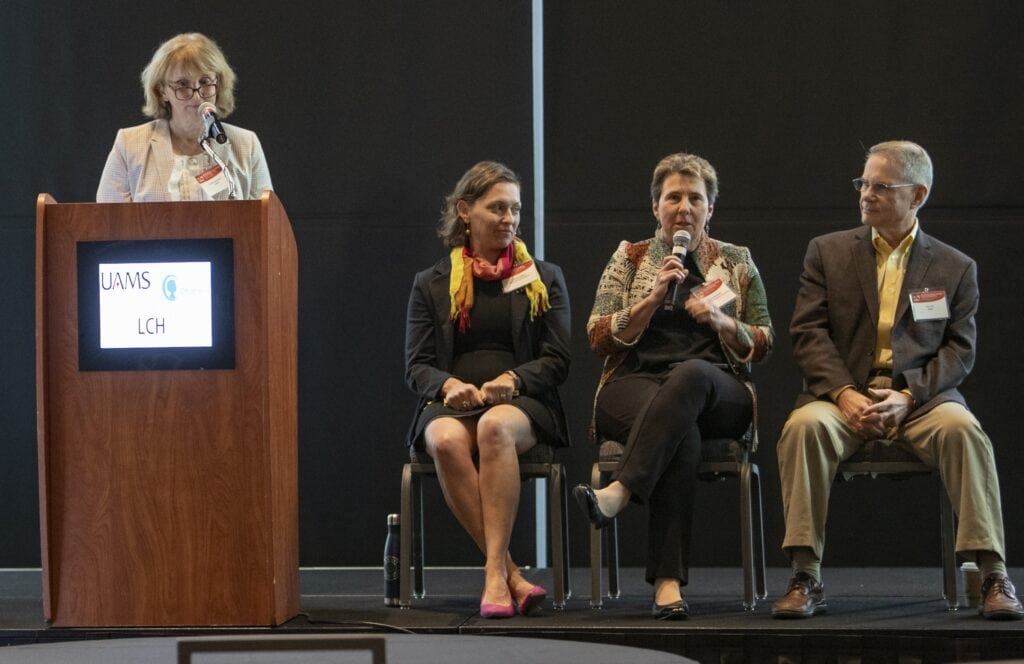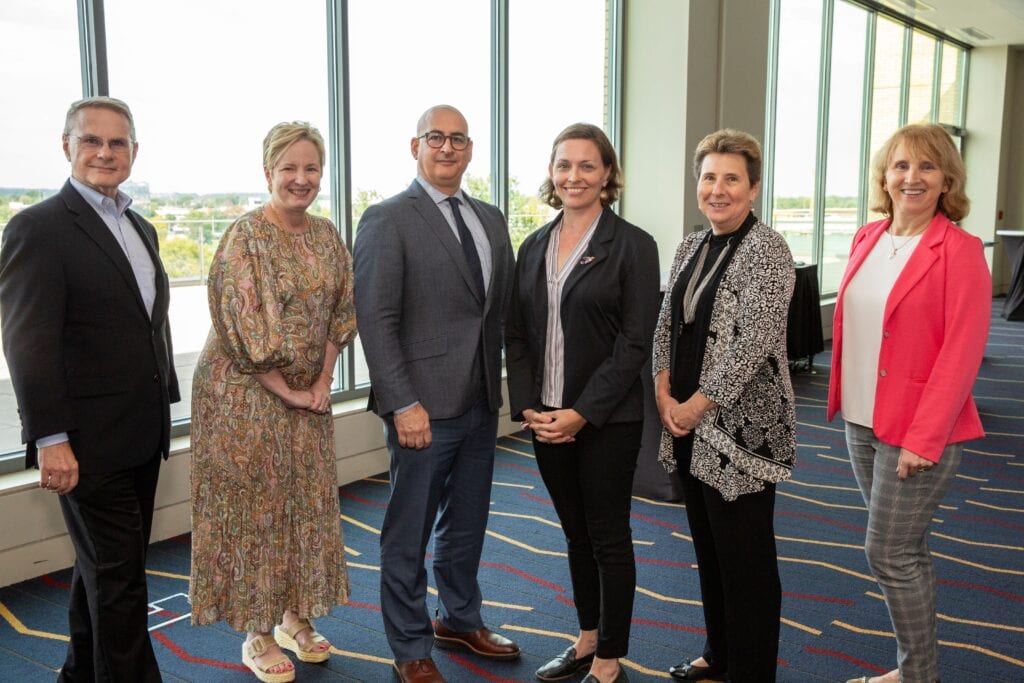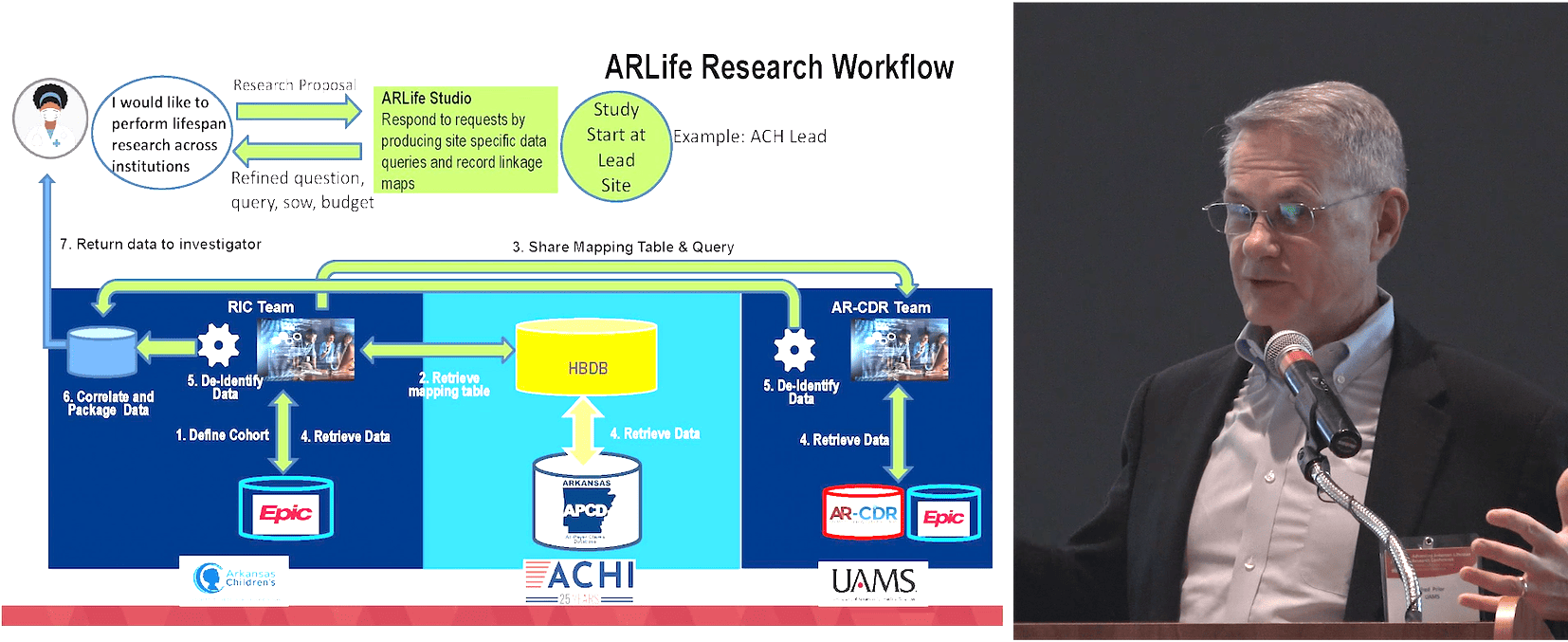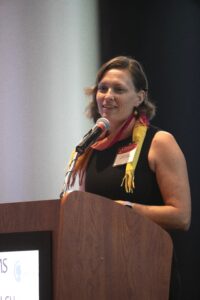
Before the terms “life-course” and “lifespan” research became more commonplace, Rosalind Wright, M.D., MPH, began studying how early-life experiences were contributing to the conditions she was seeing in her adult pulmonary patients.
Wright, a research leader at the Icahn School of Medicine at Mount Sinai, was a keynote speaker for the inaugural Advancing Arkansas Lifespan Research Conference in September, sponsored by TRI, Arkansas Children’s Research Institute (ACRI), and the Lifespan Cardiometabolic Health Creativity Hub in the College of Medicine.
To help make her case for lifespan research, she invoked the quote, “It’s easier to build strong children than to repair broken men.”

“When I’m taking care of patients in their 40s, 50s and 60s and they’ve already got multiple comorbidities and their lungs are shot, there’s only so much I can do,” she told a diverse audience of UAMS-affiliated researchers at the Robinson Center in Little Rock. “But if we pursue this life-course perspective, we have a real opportunity to make a difference.”
Wright is dean for Translational Biomedical Sciences and holds the Horace W. Goldsmith Professorship in Children’s Health Research at Mount Sinai Kravis Children’s Hospital and principal investigator for the Institute for Clinical and Translational Sciences at the Icahn School of Medicine. She is a developmental epidemiologist with transdisciplinary training in environmental health and stress mechanisms.
Wright gave one of three keynote presentations during the Sept. 13, 14 conference.
Other keynote speakers were Fred Prior, Ph.D., distinguished professor and chair of the UAMS College of Medicine Department of Biomedical Informatics, and Amanda Dettmer, Ph.D., a research scientist at the Child Study Center, Yale School of Medicine.
Elisabet Borsheim, Ph.D., Laura James, M.D., and Peter Mourani, M.D., served as the event’s moderators.

Borsheim, a professor in the College of Medicine departments of Pediatrics and Geriatrics, leads the Cardiometabolic Health Creativity Hub.
James is TRI director and UAMS associate vice chancellor for Clinical and Translational Research.
Mourani is president of ACRI and senior vice president and chief research officer for Arkansas Children’s.
Life-course research is a key part of ACRI’s strategic plan and it is advocated by the NIH and its National Center for Advancing Translational Sciences (NCATS) to strategically promote health and combat diseases as they progress across the lifespan.
ARLife

Prior’s presentation introduced an exciting new data integration system called ARLife that will be key to lifespan research for UAMS-affiliated researchers.
“ARLife is the first baby step toward building an informatics and data management resource that allows us to really do lifespan research effectively here in Arkansas, to be able to track all of our people across their lifespan,” he said.
It will be pilot tested as part of a new life-course research grant opportunity announced during the conference. The one-year $100,000 award is being offered by ACRI with funds from the Arkansas Biosciences Institute.
Prior and his team have expertise in data integration having led development of similar tools and processes nationally and internationally.
“We’re using what we’ve learned to crosslink databases in a privacy-preserving way,” Prior said.

ARLife can link and harmonize electronic health records data from UAMS, Arkansas Children’s Hospital, and the UAMS Arkansas Center for Health Improvement, which maintains the Arkansas All-Payer Claims Database.
Dettmer said the CTSA-funded Yale Center for Clinical Investigation (YCCI) is working to harmonize datasets and find collaborating institutions as part of the effort.
“We’re really keen to foster collaborations with other CTSAs so that we can show NCATS that we’re collaborating across CTSAs to really leverage existing resources to spawn and launch lifespan research,” she said.
Primate Studies
The YCCI lifespan initiative emphasizes critical developmental periods and how early-life stress may impact typical biological development and lifelong health.
One of the challenges studying humans, Dettmer said, is that much of the work necessarily relies on retrospective accounts, and if the studies are prospective it takes decades to get age-related health outcomes.
Long-term research at Yale with rhesus monkeys, which have about a 30-year lifespan, can be an important complement to human lifespan studies, she said.
“Rhesus monkeys are an extremely valuable comparative and causal model for lifespan health,” she said.

Conference attendee and poster presenter Andrew Brown, Ph.D., was excited to see UAMS and ACRI-based researchers come together with wide-ranging expertise for conducting lifespan research.
“The conference was an inspiring collaboration between ACRI and TRI that really walked the talk of needing to work across disciplinary silos if we want to improve the lives of Arkansans,” said Brown, associate professor in the Department of Biostatistics and a biostatistics core director for the Center for Childhood Obesity Prevention at ACRI.
He said the announcement of the $100,000 grant demonstrates the commitment to lifespan research.
The conference also included a poster session as well as oral presentations from Keshari Thakali, Ph.D., Steven Barger, Ph.D., Jamie I. Baum, Ph.D., Ashley Acheson, Ph.D., Tatiana Wolfe, Ph.D., and Craig Porter, Ph.D.
